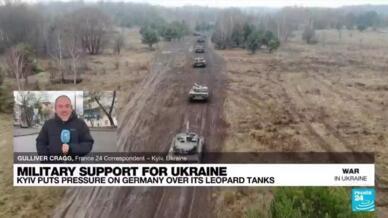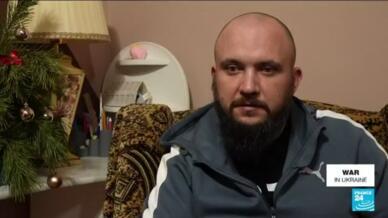Russia fired more than 20 cruise missiles and two drones at Ukraine early on April 28, killing at least 22 people, almost all of them when two missiles slammed into an apartment building in a terrifying nighttime attack, officials said. Three children were among the dead.
The missile attacks included the first one against Kyiv, Ukraine’s capital, in nearly two months, although there were no reports of any targets hit.
The city government said Ukraine’s air force intercepted 11 cruise missiles and two unmanned aerial vehicles over Kyiv.
The strikes on the nine-story residential building in central Ukraine occurred in Uman, a city located around 215 kilometers (134 miles) south of Kyiv. Twenty people died in that attack, according to the Interior Ministry. They included two 10-year-old children and a toddler.
Also read: Zelenskyy slams ‘barbaric’ Russian strike on museum
Another of the victims was a 75-year-old woman who lived in a neighbouring building and suffered internal bleeding from the huge blast’s shock wave, according to emergency personnel at the scene.
The Ukrainian national police said 17 people were wounded and three children were rescued from the rubble. Nine were hospitalised.
The bombardment was nowhere near the war’s sprawling front lines or active combat zones in eastern Ukraine, where a grinding war of attrition has taken hold. Moscow has frequently launched long-range missile attacks during the 14-month war, often indiscriminately hitting civilian areas.
Ukrainian officials and analysts have alleged such strikes are part of a deliberate intimidation strategy by the Kremlin.
The Russian Defense Ministry said the long-range cruise missiles launched overnight were aimed at places where Ukrainian military reserve units were staying before their deployment to the battlefield.
“The strike has achieved its goal. All the designated facilities have been hit,” Lt. Gen. Igor Konashenkov, the Defense Ministry’s spokesperson, said. He didn’t mention any specific areas or residential buildings getting hit.
Survivors of the Uman strikes recounted terrifying moments as the missiles hit when it still was dark outside.
Halyna, a building resident, said she and her husband were covered in glass by the blast. They saw flames outside their window and scrambled out, but first Halyna checked whether her friend in a neighbouring apartment was OK.
“I was calling, calling her (on the phone), but she didn’t pick up. I even rang the doorbell, but still no answer,” she told The Associated Press.
She used the spare keys from her friend’s apartment and went inside to check on her.
She found her lying dead on her apartment floor.
Halyna refused to provide her last name out of security concerns.
Another building resident, Olha Turina, told the AP that glass from the explosion flew everywhere.
Turina, whose husband is fighting on the front lines, said one of her child’s classmates was missing.
“I don’t know where they are, I don’t know if they are alive,” she said. “I don’t know why we have to go through all this. We never bothered anyone.”
Three body bags lay next to the building as smoke continued to billow hours after the attack.
Soldiers, civilians and emergency crews searched through the rubble outside for more victims, while residents dragged belongings out of the damaged building.
One woman, crying in shock, was taken away by rescue crews for help.
Yulia Norovkova, spokeswoman for emergency rescue crews on the scene, said local volunteers were helping nearly 150 emergency personnel. Two aid stations, including psychologists, were operating, she said.
A 31-year-old woman and her 2-year-old daughter were also killed in the eastern city of Dnipro in another attack, regional Governor Serhii Lysak said. Four people were wounded, and a private home and business were damaged.
The attacks came days after President Volodymyr Zelenskyy said that he and Chinese leader Xi Jinping held a “long and meaningful” phone call where Xi said his government will send a peace envoy to Ukraine and other nations.
Ukrainian Foreign Minister Dmytro Kuleba said Friday’s bombardment showed the Kremlin isn’t interested in a peace deal.
“Missile strikes killing innocent Ukrainians in their sleep, including a 2-year-old child, is Russia’s response to all peace initiatives,” he tweeted
“The way to peace is to kick Russia out of Ukraine.”
Czech President Petr Pavel, on a visit to Ukraine, was unconvinced by the Kremlin’s past denials of responsibility for such bloodshed.
“The number of attacks on civilian targets leads to an only conclusion that it is intentional,” Mr. Pavel told Czech media. “It’s a clear plan intended to cause chaos, horrors among the civilian population.”
Shortly after Moscow unleashed the barrage, the Russian Defense Ministry posted a photo on Telegram showing a missile launch and saying, “Right on target.”
The message triggered outrage among Ukrainians on social media and some officials, who viewed it as gloating over the casualties.
“The Ministry of Homicide of the Russian Federation is happy that it hit a residential building with a rocket and killed civilians,” said Andriy Yermak, the head of Ukraine’s presidential office.
In Kyiv, fragments from intercepted missiles or drones damaged power lines and a road in one neighbourhood. No casualties were reported.
In Ukrainka, a town about 10 kilometers (6 miles) south of Kyiv, debris from shot down missiles or drones left holes in the walls of some apartment buildings, and a smashed pink stroller in the street.
“It feels like this nightmare has been going on for two years, but I still can’t wake up,” local resident Olena, 62, said. She asked for her surname not to be used, saying her son lived in a sensitive military area.
Ukraine officials said last week that they had taken delivery of American-made Patriot missiles, providing Kyiv with a long-sought new shield against Russian airstrikes, but there was no word on whether the system was used Friday.
The city’s anti-aircraft system was activated, according to the Kyiv City Administration. Air raid sirens started at about 4 am, and the alert ended about two hours later.
The missile attack was the first on the capital since March 9. Air defenses have thwarted Russian drone attacks more recently.
The missiles were fired from aircraft operating in the Caspian Sea region, according to Ukrainian Armed Forces Commander in Chief Valerii Zaluzhnyi.
Overall, he said, Ukraine intercepted 21 of 23 Kh-101 and Kh-555 type cruise missiles launched, as well as the two drones.
The war largely ground to a halt over the winter, becoming a war of attrition as each side has shelled the other’s positions from a distance.
Ukraine has been building up its mechanized brigades with armour supplied by its Western allies, who have also been training Ukrainian troops and sending ammunition, as Kyiv eyes a possible counteroffensive.
Meanwhile, the Moscow-appointed mayor of the Russia-held city of Donetsk, Alexei Kulemzin, said a Ukrainian rocket killed seven civilians in the center of the city Friday. He said the victims died when a minibus was hit.
Source link
#Russian #missile #drone #attack #Ukraine #kills #people












.JPG)




.jpg)

